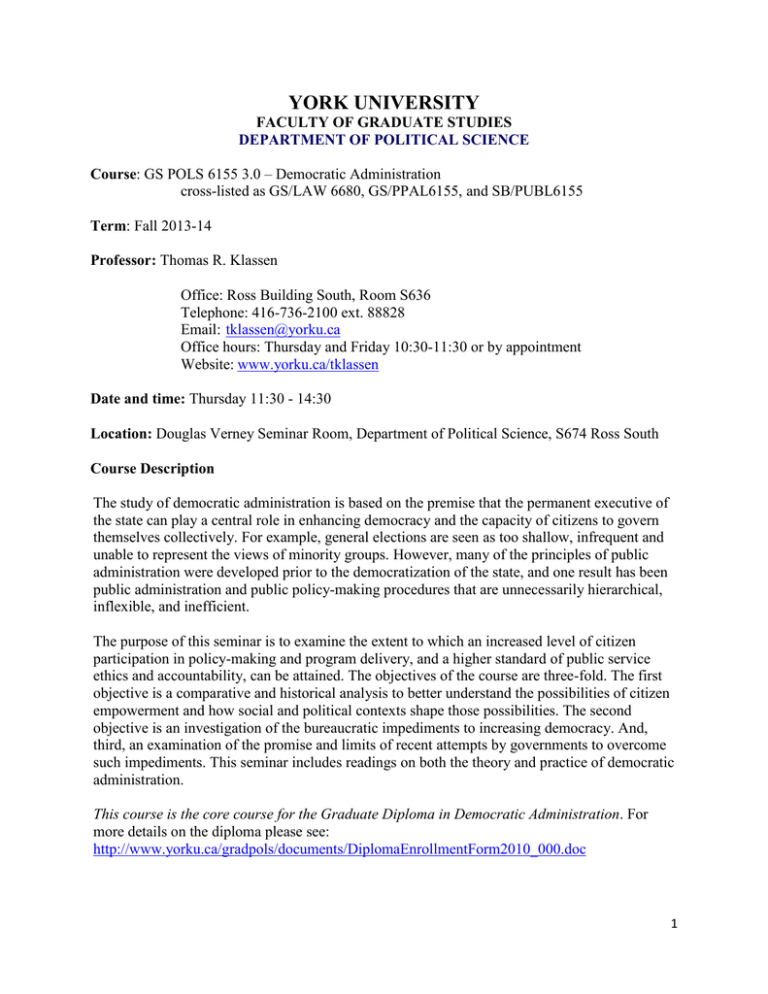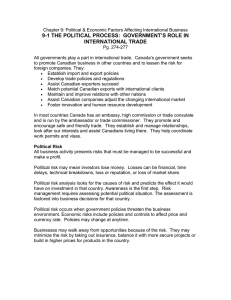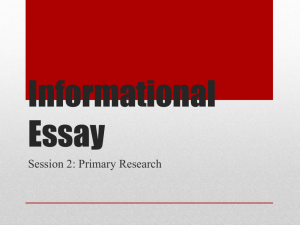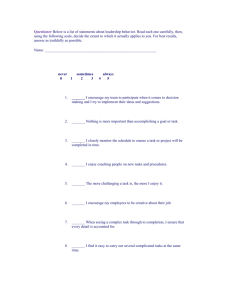Course Syllabus
advertisement

YORK UNIVERSITY FACULTY OF GRADUATE STUDIES DEPARTMENT OF POLITICAL SCIENCE Course: GS POLS 6155 3.0 – Democratic Administration cross-listed as GS/LAW 6680, GS/PPAL6155, and SB/PUBL6155 Term: Fall 2013-14 Professor: Thomas R. Klassen Office: Ross Building South, Room S636 Telephone: 416-736-2100 ext. 88828 Email: tklassen@yorku.ca Office hours: Thursday and Friday 10:30-11:30 or by appointment Website: www.yorku.ca/tklassen Date and time: Thursday 11:30 - 14:30 Location: Douglas Verney Seminar Room, Department of Political Science, S674 Ross South Course Description The study of democratic administration is based on the premise that the permanent executive of the state can play a central role in enhancing democracy and the capacity of citizens to govern themselves collectively. For example, general elections are seen as too shallow, infrequent and unable to represent the views of minority groups. However, many of the principles of public administration were developed prior to the democratization of the state, and one result has been public administration and public policy-making procedures that are unnecessarily hierarchical, inflexible, and inefficient. The purpose of this seminar is to examine the extent to which an increased level of citizen participation in policy-making and program delivery, and a higher standard of public service ethics and accountability, can be attained. The objectives of the course are three-fold. The first objective is a comparative and historical analysis to better understand the possibilities of citizen empowerment and how social and political contexts shape those possibilities. The second objective is an investigation of the bureaucratic impediments to increasing democracy. And, third, an examination of the promise and limits of recent attempts by governments to overcome such impediments. This seminar includes readings on both the theory and practice of democratic administration. This course is the core course for the Graduate Diploma in Democratic Administration. For more details on the diploma please see: http://www.yorku.ca/gradpols/documents/DiplomaEnrollmentForm2010_000.doc 1 Course Readings Required readings are available electronically via the York University Libraries. Additional required readings will be assigned based on the interests of the students in the course. Evaluation Seminar leadership and participation Draft outline of research paper Presentation of selected paper/article/book Oral presentation of draft final paper Final research paper Date due Ongoing October 24 Oct. 24- Nov. 22 Nov. 28 and Dec. 5 Dec. 5 Worth (%) 20 10 15 10 45 Note: Late assignments will not be accepted. Assignments may only be submitted in hard copy during office hours or class time. Missed oral presentations will be graded as zero. Weekly attendance is mandatory. The last day to drop this course without receiving a grade is November 8, 2013. students will have the opportunity to sign up to lead the discussion for one reading each week, and also to present on a readings of their choice not on the course outline. Students will have an opportunity to present their draft final papers on November 28 and December 5 so that they may receive comments from colleagues. Presentations must be professional in all regards. Students are reminded that the presentation and the final paper must incorporate course readings, as well as additional readings, related to their final research paper. WEEKLY SCHEDULE Week I – September 12 – Introduction and Course Overview Week II – September 19 - Key Concepts and Terms Watch: http://www.youtube.com/watch?v=gmOvEwtDycs&NR=1&feature=fvwp [two British bureaucrats speaking] Watch: Beth Noveck in Demand a more open-source government http://on.ted.com/b9En Gauvin, François-Pierre and Julia Abelson. Primer on Public Involvement. Toronto: Health Council of Canada. Please read pages 8-18. Available as an ebook at: http://site.ebrary.com.ezproxy.library.yorku.ca/lib/oculyork/docDetail.action?docID=10133557& p00=handbook%20public%20administration%20canada 2 Woller, Gary M. 1998. “Toward a reconciliation of the bureaucratic and democratic Ethos Administration & Society” 30(1), 85-109. Available at: http://aas.sagepub.com/content/30/1/85.full.pdf+html Stark, A. 2002. “What is the new public management?” (book review essay), Journal of Public Administration Research and Theory, 12(1), 137-152. Available from Library electronic journals. Arnstein, Sherry R. (1969) “A ladder of citizen participation,” Journal of the American Institute of Planners” 35:4, 216-224 http://dx.doi.org/10.1080/01944366908977225 Recommended reading: Sossin, Lorne. 2002. “Democratic administration” in Handbook of Public Administration in Canada (pp.77-99). Toronto, ON: Oxford. Ostrom, Vincent. 1989. The Intellectual Crisis in American Public Administration. Tuscaloosa: The University of Alabama Press. See in particular “The intellectual mainstream in American public administration” (chapter 2, pages 20-41) and “A theory of democratic administration: The rejected alternative” (chapter 4, pages 65-86). Pateman, Carole. 1970. Participation and Democratic Theory. Cambridge: Cambridge University Press. See especially chapter 5 (pages 22-44) “Rousseau, John Stuart Mill and G.D.H. Cole: A participatory theory of democracy.” Week III – September 6 - The Democratic Deficit in Public Policy and Administration Tholen, Barry. 2004. “Democratic renewal and the legitimacy of bureaucracy: Max Weber’s critique of civil servants-rule” Research paper of the Netherlands Institute for Government. Available at: http://repub.eur.nl/res/pub/1752/NIG2-03.pdf DeLeon, L. & DeLeon, P. 2002. “The democratic ethos and public management,” Administration and Society 34(2), 229-250. Available from library electronic journals. Halseth, Greg and Annie Booth. 2003. “What works well; what needs improvement: Lessons in public consultation from british columbia’s resource planning processes,” Local Environment, Vol. 8, No. 4, 437–455. Available from Library electronic journals or directly at: http://cstc.bc.ca/downloads/Booth-Halseth%20%20Lessons%20in%20Public%20Consultation%20BC%20Planning%20Process.pdf Recommended reading: Greene, Ian and David Shugarman. 1997. Honest Politics: Seeking Integrity in Canadian Public Life. Toronto: Lorimer. See especially chapter 1. 3 Week IV – October3 - Democracy and Regulation Ostrom, E. 1999. “Coping with the tragedy of the commons,” Annual Review of Political Science 2, 493-535 Available from Library electronic journals. Howlett, M. and Rayner, J. 2004. “(Not so) ‘Smart regulation’? Canadian shellfish aquaculture policy and the evolution of instrument choice for industrial development,” Marine Policy 28, 171-184. Available from Library electronic journals. Winfield, M.S., Whorley, D. & Kaufman, S.B. 2002. “Public safety in private hands: A study of Ontario's technical standards and safety authority,” Canadian Public Administration, 45(1), 2451. Available from Library electronic journals. Recommended reading: Doern, G.B. and R. Johnson. 2006. “Multilevel regulatory governance: Concepts, context and key issues,” in G.B. Doern and R. Johnson (eds.) Rules, Rules, Rules: Multilevel Regulatory Governance. Toronto: University of Toronto Press, pp. 3-28. Week V – October 10 - Democratic Administration and Innovation Frug, J. 1990. “Administrative democracy,” University of Toronto Law Journal 40 (3), 559-586. Available from Library electronic journals. Price Boase, J. 2000. “Beyond government? The appeal of public-private partnerships,” Canadian Public Administration 43(1), 75-92. Available from Library electronic journals. Roy, Jeffrey. 2008. “Beyond Westminster governance: Bringing politics and public service into the networked era,” Canadian Public Administration 51(4) 541-568. Available from Library electronic journals, and also at: http://www.mikekujawski.ca/ftp/Westminster.pdf eDemocracyBlog.com - Thoughts on eDemocracy, eGovernment, politics and technology Recommended reading: Behn, R.D. 2008. “The adoption of innovation: the challenge of learning to adapt tacit knowledge,” in Sanford Borins (ed.) Innovations in Government: Research, Recognition, and Replication (Washington, DC: Brookings Institute), pp. 138-158. Bendix, R. 1965. “Bureaucracy and the problem of power,” in Robert K. Merton, et al., Reader in Bureaucracy (New York: The Free Press), pp. 114-135. 4 Week VI – October 17 - The Politics of Discretion Sossin, Lorne. 2002. “Law and intimacy in the bureaucrat-citizen relationship” in Personal Relationships of Dependence and Interdependence in Law. The Law Commission of Canada Vancouver: UBC Press, pp 120-154. Available as an ebook at: http://site.ebrary.com.ezproxy.library.yorku.ca/lib/oculyork/docDetail.action?docID=10087597& p00=citizens%20bureaucrats Johnson, Genevieve Fuji. 2011. “The Limits of Deliberative Democracy and Empowerment: Elite Motivation in Three Canadian Cases”. Canadian Journal of Political Science 44(1), 137159. Roberts, A. 2002. “Administrative discretion and the access to information act,” Canadian Public Administration 45(2), 175-195. Available from Library Electronic Journals. Recommended reading: Goodsell, C. 1994. The Case for Bureaucracy: A Public Administration Polemic (3rd edition) chapter 5. Chatham, NJ: Chatham House Publishers. Week VII – October 24 - Reinventing Government: The Marketization of the State? Peters, Guy B. 2002. “Governing in a market era: Alternative models of governing” chapter 5 in Public Administration: An Interdisciplinary Critical Analysis edited by EranVigoda. New York: Marcel Dekker. pp 85-97. Available as an ebook at: http://site.ebrary.com.ezproxy.library.yorku.ca/lib/oculyork/docDetail.action?docID=10051418& p00=democratic%20administration Dutil, Patrice A., Cosmo Howard, John Langford and Jeffrey Roy. 2008. “Rethinking government-public relationships in a digital world: Customers, clients, or citizens?” Journal of Information Technology & Politics 4 (1), 77-90. Available at: http://www.tandfonline.com.ezproxy.library.yorku.ca/doi/pdf/10.1300/J516v04n01_06 Whorley, D. 2001. “The Andersen-Comsoc affair: Partnerships and the public interest,” Canadian Public Administration 44, 320-345. Available from Library electronic journals. Peters, B.G. 1998. “Governance without government? Rethinking public administration,” Journal of Public Administration Research and Theory 8(2), 223. Available from Library electronic journals. Terry, L.D. 2005. “The thinning of administrative institutions in the hollow state,” Administration & Society 37(4), pp.426-444. Available from Library electronic journals. Recommended reading: 5 Osborne, David and Ted Gaebler. 1992. Reinventing Government: How the Entrepreneurial Spirit is Transforming the Public Sector. Reading, Mass.: Addison-Wesley. October 31 – Reading/Co-Curricular Week – no class Week VIII – November 7 - State, Citizens, Social Movements and Public Participation Denhardt, J.V. and K.B. Campbell. 2006. “The role of democratic values in transformational leadership,” Administration and Society 38(5), 556-72. Available from Library electronic journals. Baccaro, Lucio and Konstantinos Papadakis. 2009. “The downside of participatory-deliberative public administration.” Socio-Economic Review 7(2), 245-276. Available from library electronic journals. Coleman, Stephen and Jay G Blumler. 2009. Internet and Democratic Citizenship: Theory, Practice and Policy. Cambridge: Cambridge University Press. Please read chapter 5 “EDemocracy from Below” Available as an ebook at: http://web.ebscohost.com.ezproxy.library.yorku.ca/ehost/detail?sid=5276c81f-007a-40c5-b3e5dd893945c753%40sessionmgr14&vid=1&hid=19&bdata=JnNpdGU9ZWhvc3QtbGl2ZQ%3d% 3d#db=nlebk&AN=304685 Recommended reading: Wilson, H. Thomas. 2001. “The civil service in capitalist democracies & bureaucratic representation through implementation processes.” Chapter 2 of Bureaucratic Representation: Civil Servants and the Future of Capitalist Democracies. Boston, MA: Brill. McElligott, G. 2001. “Front-line workers and public policy” and “State workers and democratic administration.” Chapters 7 and 8 in Beyond Service: State Workers, Public Policy, and the Prospects for Democratic Administration. Toronto, ON: University of Toronto Press. Week IX –November 14 - International Development and Democratic Administration OECD. 2009. Focus on Citizens: Public Engagement for better Policy and Services. Paris. OECD. Read three sections that are of interest, with at least one country study. Available at: http://www.oecd.org/document/25/0,3746,en_2649_33735_42216857_1_1_1_1,00.html United Nations Research Institute on Development (2005) Gender Equality: Striving for Justice in an Unequal World. Chapter 11 “Gender and good governance.” Available online from UNRID. Note: In order to access the document you must complete a very short user survey. 6 Otenyo, Eric E. 2006. “Vincent Ostrom's democratic administration and new public management in East Africa.” Paper prepared for discussion at the Indiana University’s Workshop in Political Theory and Policy Analysis. Available at: http://www.indiana.edu/~voconf/papers/otenyo_voconf.pdf Recommended reading: Otenyo, Eric E. and Nancy Lind. 2006. Comparative Administration: The Essential Readings. London: Elsevier. Week X – November 21 - Public Employees and Democratic Administration Chappell, L. 2002. “The Femocrat strategy: Expanding the repertoire of feminist activities,” Parliamentary Affairs 55(1), 85-98. Available from Library electronic journals. Bourgon, Jocelyne. 2007. “Responsive, responsible and respected government: Towards a New Public Administration theory,” International Review of Administrative Sciences 73(1), 7-26. Available from Library electronic journals. Week XI – November 28 - Oral presentation of draft final paper Readings to be assigned Week XII – December 5 - Oral presentation of draft final paper Please note that the final paper is due on this date. Resources There is considerable information available on the Web on public administration. Some of the web sites below may be of assistance in your research and of interest in exploring issues related to democratic public administration. The web-sites can be accessed directly from the course outline posted on the Web. Primarily Public Administration Related Canada School of Public Service: information about the latest news and trends in executive learning, including information about executive education and development programs and services and to documents 7 Canadian Government Executive: magazine for public sector decision makers containing stories on emerging public policy and public administration developments and innovations Canadian Government Information on the Internet: classified by subject, province, and municipality; includes a list of government discussion groups compiled Public Works and Government Services Canada Guide to Canadian Political Science Resources: links to current information about Canadian government institutions and the policy making process from the National Library of Canada at http://www.collectionscanada.gc.ca/caninfo/ep032.htm#32 Index to Federal Royal Commissions: materials associated with the more than 150 federal Royal Commissions that have taken place since Confederation from the National Library of Canada The Innovation Journal: independent, peer-reviewed, Internet-based journal devoted to sharing ideas and discussing public sector administration innovation Office of the Auditor General of Canada: publications, including searchable full text of the Reports of the Auditor General Parliamentary Internet Parlementaire: access to the House of Commons, Senate and the Library of Parliament, including debates, committee proceedings, and status of legislation Privacy Commissioner of Canada: includes annual reports Privy Council Office: includes annual reports to the Prime Minister Public Service Commission Library: includes research papers on public service reform Public Administration Institutes and Think Tanks Institute of Public Administration of Canada: national non-profit organization, concerned with the theory and practice of public management, with 17 regional groups across Canada United Nations Online Network in Public Administration and Finance: forum for knowledge, experiences and best practices worldwide of sound public policies, effective public administration and efficient civil service. Primarily Policy Related Caledon Institute of Social Policy Canada West Foundation 8 Canadian Council on Social Development (CCSD) Canadian Labour Congress Canadian Policy Research Networks (CPRN) CD Howe Institute Conference Board of Canada Fraser Institute International Labour Organization Institute for Research on Public Policy (IRPP) International Reform Monitor Organisation for Economic Development and Cooperation (OECD) Policy Horizons Canada Other useful electronic sources of information: Canadian Social Research Links Elections Canada 9







